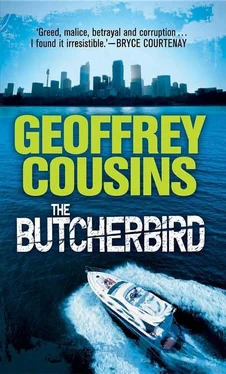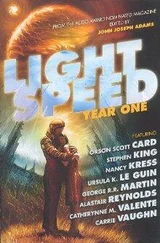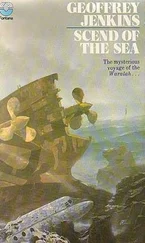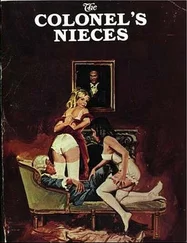Geoffrey Cousins - The Butcherbird
Здесь есть возможность читать онлайн «Geoffrey Cousins - The Butcherbird» весь текст электронной книги совершенно бесплатно (целиком полную версию без сокращений). В некоторых случаях можно слушать аудио, скачать через торрент в формате fb2 и присутствует краткое содержание. Жанр: Триллер, на английском языке. Описание произведения, (предисловие) а так же отзывы посетителей доступны на портале библиотеки ЛибКат.
- Название:The Butcherbird
- Автор:
- Жанр:
- Год:неизвестен
- ISBN:нет данных
- Рейтинг книги:5 / 5. Голосов: 1
-
Избранное:Добавить в избранное
- Отзывы:
-
Ваша оценка:
- 100
- 1
- 2
- 3
- 4
- 5
The Butcherbird: краткое содержание, описание и аннотация
Предлагаем к чтению аннотацию, описание, краткое содержание или предисловие (зависит от того, что написал сам автор книги «The Butcherbird»). Если вы не нашли необходимую информацию о книге — напишите в комментариях, мы постараемся отыскать её.
The Butcherbird — читать онлайн бесплатно полную книгу (весь текст) целиком
Ниже представлен текст книги, разбитый по страницам. Система сохранения места последней прочитанной страницы, позволяет с удобством читать онлайн бесплатно книгу «The Butcherbird», без необходимости каждый раз заново искать на чём Вы остановились. Поставьте закладку, и сможете в любой момент перейти на страницу, на которой закончили чтение.
Интервал:
Закладка:
Everything that wasn’t bolted down was to be sold, no reserves.
And everyone wanted a piece of this story. It reminded the Sotheby’s vice-president, visiting from New York-because how many auctions were held on boats, anywhere, and because this story of corporate fraud had even found its way into the New York Times, causing him to book a flight at uncomfortably short notice, in the sense that only business-class seats were available-it reminded him of the Andy Warhol auction. There was a madness in the air, a wonderful sense of irrationality that would cause people to spend money they had no intention of spending. The intrinsic value of the goods would bear no relation to the prices paid. It was an auctioneer’s dream. The vice-president shivered at the wonder of it all. It was vital to be here, no matter what the discomfort required.
The other eagerly awaited thrill for the lucky invitees was the vicarious, guilty pleasure of rifling through the personal belongings of a famous, or infamous, person while he was still alive. This was living history-or a peepshow. Either way, it was irresistible. Virtually everything but the underwear was for sale and there were surprises in every corner for those with an eye for detail, and there were many such eyes on hand.
In a small study off the main saloon, for instance, was displayed a vast array of books of unexpected variety. There was an extensive collection of poetry in signed first editions, ranging from Shelley to Keats, from the American poet Elizabeth Bishop to the famous Australian expatriate Peter Porter. It was the collection of a serious reader and, by the look of it, had been read. Surely it wasn’t Mac Biddulph’s? He was known as a connoisseur of more basic pleasures. So whose were the books? His wife’s? But she was said to barely speak, let alone to read. It was most curious and intriguing. There was a fine collection of biographies of political leaders, adventurers, scientists and inventors, but none of business people.
And then there were the artworks. Of course the Moore had been expected, and the gem of a Matisse, but they were trophy pieces that were assumed to have been acquired through a consultant. Yet here was a wide variety of drawings and artefacts, small sculptures, paintings by lesser-known Australian artists, and a fine collection of Aboriginal works from Arnhem Land and Kalumburu and Ramingining. Many were not of great value, but all were of high quality, all had been selected with a discerning eye. Whose eye? The leading dealers were here; none had any knowledge of some expert buying for Mac Biddulph. A few recognised works they’d sold, but not to Mac; some they’d seen bid for by telephone at one auction or other. None of it seemed to fit with their knowledge of the man who’d owned all of this.
If, of course, he had owned any of it. Nowhere in the catalogue or the provenance of any of the works was the name Macquarie James Biddulph mentioned. The banking syndicate had insisted on its omission, apparently despite the strong objections of the Sotheby’s claque, who’d suggested that its absence would depress sales. The bank seemed to have been right-there was no chance of anything depressing the irrepressible spirit of this auction.
It was rumoured that the doyenne of party organisers, Popsie Trudeaux, had supplied the guest list for the evening, although Sotheby’s denied this. They said they had no need for anyone’s list except their own. But other than the art dealers, the crowd was suspiciously similar to that in attendance at the party of all parties, the opening of the Biddulph Gallery.
And that was the other piece of delicious gossip tantalising the unnaturally pursed lips of every Botoxed woman in the saloon. Was it true, could it be true, that the museum trustees were plotting to remove the Biddulph name? Surely not? He had given the money, after all. Perhaps it wasn’t his to give, but did that matter? If someone coughed up, surely they were entitled to expect what was promised. It was only decent behaviour; otherwise there was anarchy-you couldn’t rely on anyone. The general consensus was that the name should stay. After all, there were many other institutions and university chairs and whatnot named after brigands and bounders and bankrupts, weren’t there? Someone in the crowd began to draw up a list of such persons to present to the chairman of trustees, who was standing at the front of the room, but soon realised it was unwise. The list was long.
Naturally, the subject of all this speculation, this delicious lip-pursing chin-stroking gossip, the former master of this proud vessel, which was itself to be humbled in another auction the next day, a show auction admittedly since the buyer was already identified, this ghost who may have browsed through these poetry books, have rubbed these bronzes with loving hands, he was a presence by his absence. But everyone else was here.
And there was a party mood, despite the lack of alcohol, despite the lack of real music. This was a festive occasion. It was true one of their number had fallen. That was, in its way, sad. But there were two mitigating factors. First, he’d never really been one of them, not really. Second, they hadn’t fallen.
Whether Popsie Trudeaux had provided the guest list or not, she was intent on providing as much of her ample bosom as possible, to anyone who wanted it. Particularly to the Sotheby’s vice president from New York. He was travelling alone. She’d ascertained that in the first thirty seconds of their conversation. He was visibly under fifty and came from an old Boston family.
New York was apparently merely a useful place of commerce for him. Old Boston families were rich, at least in the books Popsie read, which admittedly were few. And, surprisingly, he appeared to be interested in women. Not necessarily in her yet, but the man needed to relax, to have the tensions of travel eased away. She would do what she could. He was in conversation with Archie Speyne, who was said to be here to direct the museum’s bidding on the Matisse, but she drew the vice president away to ask his advice on certain artworks, on which she had no intention of bidding. People melted when asked for their advice.
And they always gave more of it than you really needed.
There was one other notably absent figure. The distinguished presence of Sir Laurence Treadmore, a presence that was known to have graced these rooms in better times, was nowhere to be seen. The Sotheby’s folk were bitterly disappointed. Desperate phone calls had been made to any number of his intimate acquaintances, of which he had none, in order to lure this bird into their bower, but to no avail. They hadn’t desired Sir Laurence as a bidder-they were aware he was seldom that-but as a phenomenon of the moment, as someone who had transcended mere public recognition and risen into the social firmament. For Sir Laurence was the only member of the cast in the HOA tragedy who had been lionised in the press as a messiah, a possible saviour, a man of integrity who had tried to hold back the forces of fraud and manipulation and trickery that were threatening to engulf the company. He’d spoken out for the shareholders, all the shareholders-why he was even buying shares himself, as an expression of confidence in the future of the company. He’d committed to remaining as chairman and had temporarily taken over an executive role until a new chief executive could be found. What more could be asked of a busy man?
It was said there were recordings of Sir Laurence pleading with Jack Beaumont and Mac Biddulph to investigate possible wrongdoing, more than once it was rumoured, but nothing had been done. For obvious reasons, in Mac’s case. The question of Jack Beaumont’s behaviour was more complex. The recent articles in the press, one headlined ‘A Corporate Gladiator’, had thrown confusion over what had seemed another unfortunate, but oddly satisfying, fall. People rose, people fell. But they seldom rose again; the resurrection was not a popular social phenomenon. Yet a great deal of factual material, cogently argued, had been presented in those articles, the second of which the authorities had tried to ban. The paper had won a court battle in order to publish, which had apparently boosted its circulation considerably.
Читать дальшеИнтервал:
Закладка:
Похожие книги на «The Butcherbird»
Представляем Вашему вниманию похожие книги на «The Butcherbird» списком для выбора. Мы отобрали схожую по названию и смыслу литературу в надежде предоставить читателям больше вариантов отыскать новые, интересные, ещё непрочитанные произведения.
Обсуждение, отзывы о книге «The Butcherbird» и просто собственные мнения читателей. Оставьте ваши комментарии, напишите, что Вы думаете о произведении, его смысле или главных героях. Укажите что конкретно понравилось, а что нет, и почему Вы так считаете.












